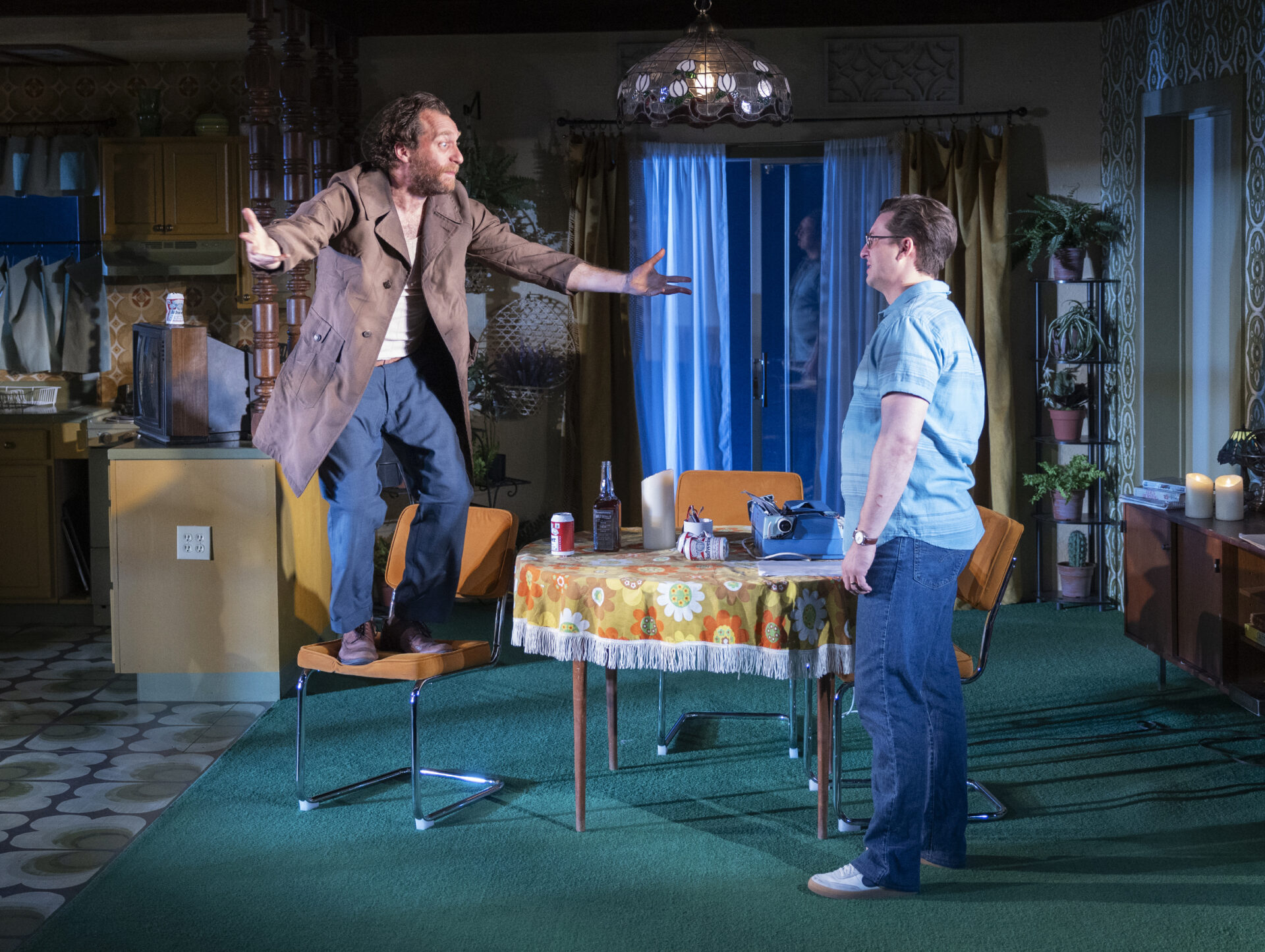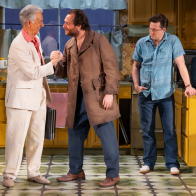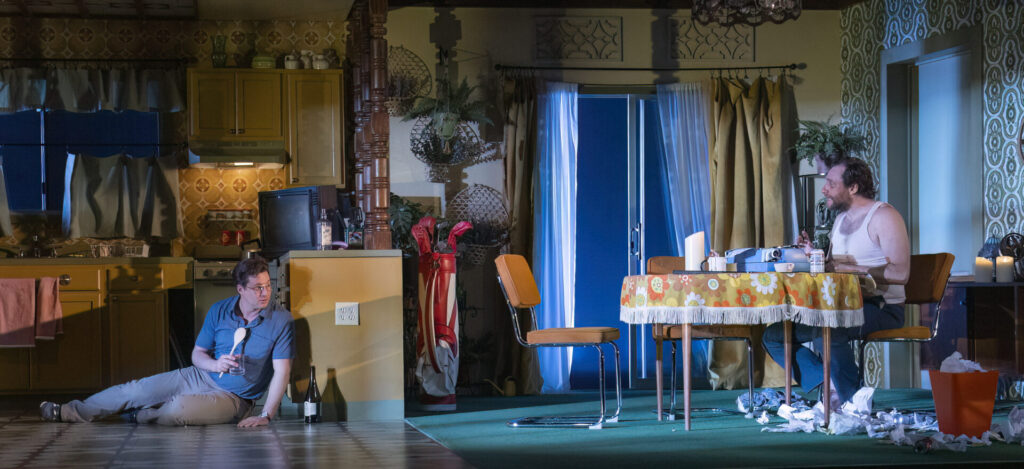
“True West” at Arizona Theatre Company is about more than sibling rivalry
By Sam Dingman. Originally published by KJZZ.
By the time Sam Shepard published his classic play True West in 1980, he’d already won a Pulitzer Prize. His acting career was on the rise after a star turn in Terrence Malick’s “Days of Heaven.”
After more than a decade rising through the ranks of New York’s off-off Broadway theater scene, Shepard suddenly found himself perched on the edge of Hollywood fame and fortune. It was a life that probably seemed pretty far-fetched when he was growing up on a ranch in the 1950s.
True West is the story of two brothers, Austin and Lee, who’ve taken very different paths. Austin is a semi-successful screenwriter, and Lee is an alcoholic vagabond who spends his days bumming around the desert, breaking into houses and stealing televisions. They haven’t seen each other for years. But when Austin decides to house-sit at their mother’s bungalow in southern California for a few days to work on his latest script, Lee makes an unexpected appearance.
Before long, Lee has hijacked Austin’s writing process and bullied him into helping write the script for what Lee calls an “authentic Western.” The writing process gradually devolves into a chaotic and violent standoff between two brothers with old scores to settle.
For Jenn Thompson, who’s directing the Arizona Theatre Company’s current production, True West is about much more than sibling rivalry. She spoke with The Show’s Sam Dingman.



JENN THOMPSON: It was really about the creation of art.
SAM DINGMAN: Yes.
THOMPSON: And Sam Shepard really documenting and chronicling the writing experience. You know, he was in the early part of his fame then. And I think it really ended up being a real meditation about the pursuit of that or what it does to you or how it corrupts the work, or does it corrupt the work? And I thought that was really fascinating.
DINGMAN: Yeah, absolutely. I mean, one of my favorite lines from the play is from Lee, one of the brothers, who says towards the end, I need something authentic, something to keep me in touch.
THOMPSON: I think there’s so many of those moments in the show where it feels kind of like Sam Shepard is, is expressing, you know, something very personal.
DINGMAN: One of my other favorite lines in the play and I wonder if you could tell me what you make of this moment is, it comes again somewhat towards the end. And Lee is literally destroying the kitchen of this house where the two brothers spend the whole play. And he says, you know, he’s like ripping stuff out of drawers. I think it’s, he’s looking for something to write with.
THOMPSON: Yeah, looking for a pencil.
DINGMAN: And he says, this would have never happened in the desert.
THOMPSON: Oh, I love that you picked up on that one. That’s so interesting. Yeah. I mean, in the context of what’s happening in the, in the show, he’s looking for a, a pencil or a pen to write down a phone number with. But I think what it’s talking about maybe is he wouldn’t even need a pencil in the desert.
DINGMAN: Right. Right. The pencil as, as kind of a, an avatar for the, the invention of need.
THOMPSON: Yeah, that’s right.
DINGMAN: Well, one of the things that I, I went back to the play to revisit it prior to our conversation. And one of the things that stood out to me this time is the role of Arizona specifically and it’s the desert in Arizona where the brother’s father has ended up literally lost and toothless, unable to take care of himself.
THOMPSON: Yes, that’s right. You know, for me, in terms of the desert, for those guys, I mean, there’s a huge push and pull between the, the brothers about just the notion of their dad. You know, Lee keeps trying to redeem him, like, let’s help him, let’s go out and, you know, we could put this money toward, you know, rehabbing him in some way and it really is often that’s like, he’s beyond hope. He’s just going to drink it all up. There is no redemption for him.
And so I do think there’s a lot of parallels between like what, what the desert represents and just this dad, this ghost dad. It’s one idea of the sort of Marlboro man versus the reality of this guy drunk and destitute and living a very challenging existence. And I love that also, that idea, too, of, you know, you can grow up in the exact same environment and have a completely different experience of your parents. So I think that’s a very interesting thing about the play as well.
DINGMAN: So let’s, let’s talk about the the family dynamics. Obviously, the backdrop of the story is the way that both the brothers’ mom and their dad have kind of shaped them. How did you work with the actors to build these characters and to think about the role of the family dynamics in creating them?

THOMPSON: Well, of course, we have the mom in the play. So Amelia White plays the mom and, and she was a part of that talking about that back story. And there’s this, you know, this dad that looms so large throughout and of course he isn’t in the play. He’s just spoken about a lot. You know, I had had a notion that the father had left, and I thought there was an interesting idea that Lee the older brother had, had a lot more actual time in the house because he was older with that father before he left and been exposed to a lot more about him. A lot more of that drinking. Potentially a lot more of that abuse.
DINGMAN: Well, you know, something that just occurred to me as you were describing that difference in Lee and Austin’s experience of the father is there is that scene where Lee and Austin are having their most brutal fight of the whole play and the mom is standing there and she is totally dissociating. She’s just kind of saying, like, if you’re going to kill him, can you do it outside or something like that?
THOMPSON: Yes, there’s a great line of, let him breathe, a little.
DINGMAN: Yeah. Yeah. But I hadn’t, I had, it hadn’t occurred to me until you just were talking about your vision of the back story here that in a household and a marriage, like the one you’ve conceived of that would have been learned behavior for her.
THOMPSON: Oh, sure. Can you imagine like how explosive that household must have been? And, yeah, you know, and of course, this is very personal territory for Sam Shepard. His father was, struggled with alcoholism, you know, for most of his life and certainly all of Sam Shepard’s life. And, and so, yeah, there’s a sort of exposure and a sort of coping mechanism that takes place.
DINGMAN: Another moment that jumped out at me this time that I had completely forgotten about is the part where she says to them, as I was on my way down here, I saw that Pablo Picasso is going to be in town and I thought we could go meet him. What, what do you make of that moment?
THOMPSON: I mean, it’s a reference to art. It, it’s an interesting family dynamic where, you know, Austin is obviously the more accomplished, established writer or artist. But it was my notion anyway, that Lee is talented, you know, that there is some kind of genius in him.

DINGMAN: But just as we’re talking about it, I guess it makes me think about the fact that Picasso is somebody who throughout his whole career was playing with the line between, do I paint an accurate representation of the person or a kind of warped expressionistic one that reveals something that is true at a deeper level, even if it doesn’t appear to be an authentic portrait.
THOMPSON: Right. You know, is there something even more authentic in that approach, in the abstract? You know, Sam Shepard wrote it in like 72 hours at his mom’s house. I mean, he just, he really just channeled this play out. There are certain artists that can open up some sort of channel to their soul or heart or whatever and just come up with something. And it, it can have all this meaning and it can have all this symbolism, but maybe they’re not even thinking about that.
And it’s a really good question about all art. How aware is the writer about what he is writing or he is writing?
DINGMAN: Absolutely. Absolutely. I mean, that makes me think about the moment where Austin calls Lee’s proposed story for his screenplay ridiculous. He says it’s just something like it’s just two knuckleheads chasing each other back and forth across the desert. But the play we’re actually watching is basically Lee’s story. I mean, they’re not literally out in the desert chasing each other across it, but they are, you know, in the west chasing each other back and forth.
THOMPSON: Yeah, he’s talking about them. I mean, but I also don’t think Lee knows he’s talking about them because I think that’s also the sign of genius. So, is how much does Sam Shepard know? I don’t know. Perhaps that’s the safety of it. It isn’t you, you get to exorcise those feelings, you get to exorcise those demons. But as somebody else.
DINGMAN: Right. Right. I mean, he’s in his mother’s house writing this play over the course of three days about a set of brothers exorcising demons in their mother’s house by writing a script. This plays like a hall of mirrors.